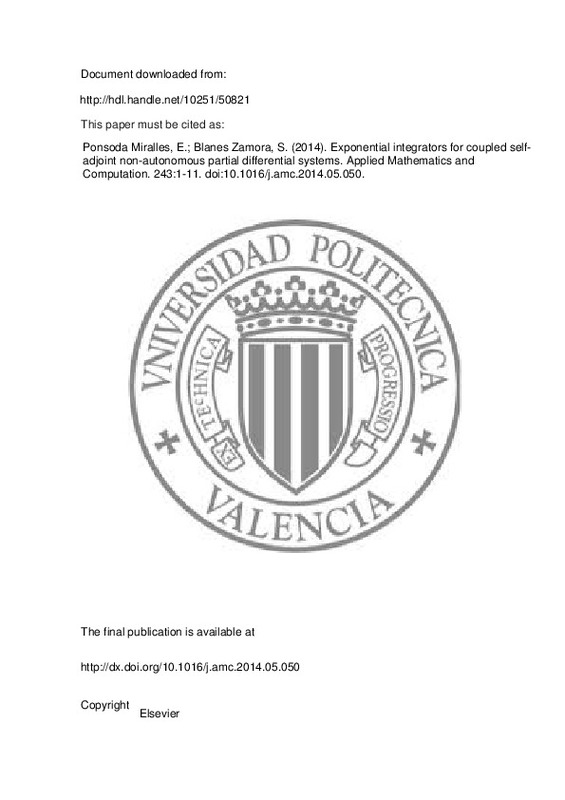JavaScript is disabled for your browser. Some features of this site may not work without it.
Buscar en RiuNet
Listar
Mi cuenta
Estadísticas
Ayuda RiuNet
Admin. UPV
Exponential integrators for coupled self-adjoint non-autonomous partial differential systems
Mostrar el registro sencillo del ítem
Ficheros en el ítem
| dc.contributor.author | Ponsoda Miralles, Enrique
|
es_ES |
| dc.contributor.author | Blanes Zamora, Sergio
|
es_ES |
| dc.date.accessioned | 2015-05-27T07:36:55Z | |
| dc.date.available | 2015-05-27T07:36:55Z | |
| dc.date.issued | 2014-09 | |
| dc.identifier.issn | 0096-3003 | |
| dc.identifier.uri | http://hdl.handle.net/10251/50821 | |
| dc.description.abstract | We consider the numerical integration of coupled self-adjoint non-autonomous partial differential systems. Under convergence conditions, the solution can be written as a series expansion where each of its terms correspond to solutions of linear time dependent matrix differential equations with oscillatory solutions that must be solved numerically. In this work, we analyze second order of Magnus integrators whose numerical error grows with the number of terms considered in the truncated series, n, at a rate that still allows us to guarantee convergence of the numerical series. In addition, the integrator can be implemented with a recursive algorithm such that the computational cost of the method grows only linearly with the number of terms of the series. Higher order Magnus integrators are also analyzed. Commutator-free Magnus integrators can be used with a similar recursive algorithm and can provide highly accurate results, but they show a faster error growth with n, and some caution must be taken if these methods are used. Numerical experiments confirm the performance of the proposed algorithm. (C) 2014 Elsevier Inc. All rights reserved. | es_ES |
| dc.description.sponsorship | The work of S. Blanes has been partially supported by Ministerio de Ciencia e Innovacion (Spain) under project MTM2010-18246-C03. The work of E. Ponsoda has also been partially supported by the Universitat Politecnica de Valencia under project 2087. | en_EN |
| dc.language | Inglés | es_ES |
| dc.publisher | Elsevier | es_ES |
| dc.relation.ispartof | Applied Mathematics and Computation | es_ES |
| dc.rights | Reserva de todos los derechos | es_ES |
| dc.subject | Non-autonomous matrix partial differential systems | es_ES |
| dc.subject | Separation of variables technique | es_ES |
| dc.subject | Series solution | es_ES |
| dc.subject | Numerical approximation | es_ES |
| dc.subject | Magnus expansions. | es_ES |
| dc.subject.classification | MATEMATICA APLICADA | es_ES |
| dc.title | Exponential integrators for coupled self-adjoint non-autonomous partial differential systems | es_ES |
| dc.type | Artículo | es_ES |
| dc.identifier.doi | 10.1016/j.amc.2014.05.050 | |
| dc.relation.projectID | info:eu-repo/grantAgreement/MICINN//MTM2010-18246-C03/ | es_ES |
| dc.relation.projectID | info:eu-repo/grantAgreement/UPV//2087/ | es_ES |
| dc.rights.accessRights | Abierto | es_ES |
| dc.contributor.affiliation | Universitat Politècnica de València. Departamento de Matemática Aplicada - Departament de Matemàtica Aplicada | es_ES |
| dc.description.bibliographicCitation | Ponsoda Miralles, E.; Blanes Zamora, S. (2014). Exponential integrators for coupled self-adjoint non-autonomous partial differential systems. Applied Mathematics and Computation. 243:1-11. https://doi.org/10.1016/j.amc.2014.05.050 | es_ES |
| dc.description.accrualMethod | S | es_ES |
| dc.relation.publisherversion | http://dx.doi.org/10.1016/j.amc.2014.05.050 | es_ES |
| dc.description.upvformatpinicio | 1 | es_ES |
| dc.description.upvformatpfin | 11 | es_ES |
| dc.type.version | info:eu-repo/semantics/publishedVersion | es_ES |
| dc.description.volume | 243 | es_ES |
| dc.relation.senia | 267842 | |
| dc.contributor.funder | Universitat Politècnica de València | es_ES |
| dc.contributor.funder | Ministerio de Ciencia e Innovación | es_ES |







![[Cerrado]](/themes/UPV/images/candado.png)

